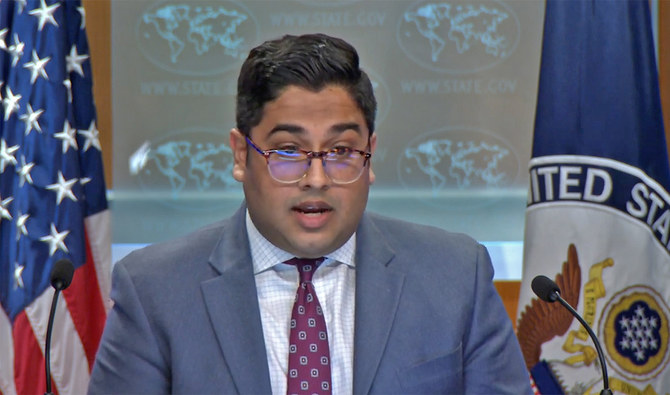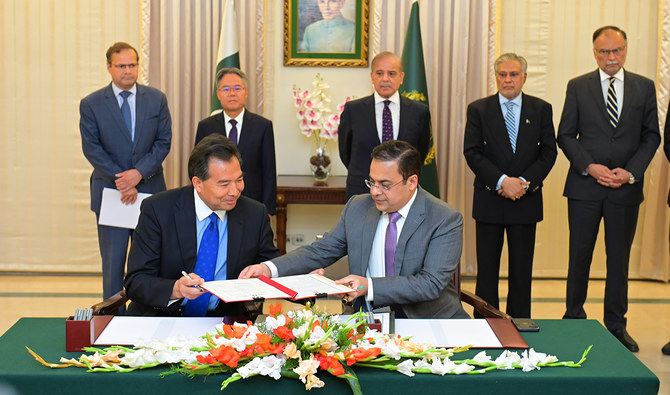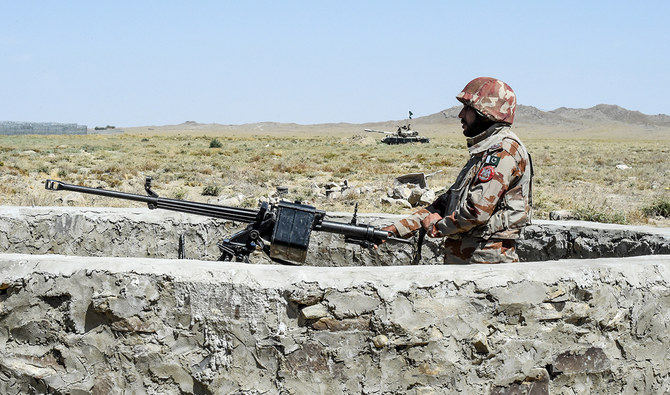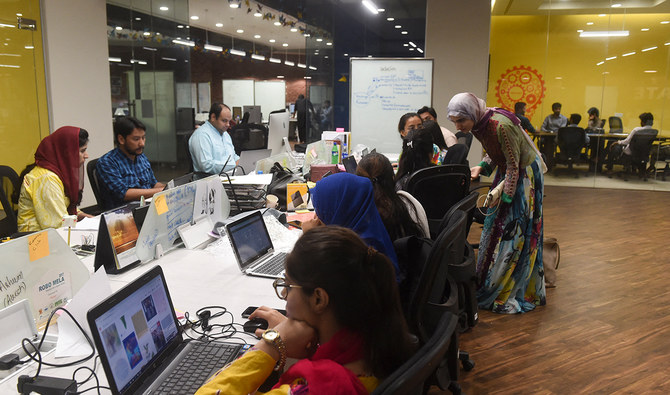KARACHI: Trapped in historic high twin deficits — current account and fiscal — Pakistan is expected to knock at the door of International Monetary Fund (IMF) seeking a financial bailout package.
The country’s caretaker Finance Minister says she is starting groundwork, leaving the option of a final decision to the forthcoming government.
“The interim government is taking steps within its limited mandate to push for stability. Groundwork is being done so that the next government can proceed with a fast pace to avail the facility from the IMF,” said Dr. Shamshad Akhtar, former governor of State Bank of Pakistan and caretaker finance minister while speaking to members of the Pakistan Stock Exchange.
“The IMF, the World Bank and the Asian Development Bank are ready to engage with Pakistan,” she added.
As the country heads toward the polls on July 25, the fiscal position of the country is deteriorating owing to “off-the-budget liabilities” of the government, pushing the country’s financial managers to seek a short-term stabilization program to support the wobbling economy.
“We have the mandate to approach IMF but the interim government has no intention to seek IMF financial assistance,” said Akhtar. “The interim government is undertaking the necessary diagnostics of the situation and analysis which hopefully will serve as useful input for the incoming government to take appropriate decisions and steps,” she clarified.
The Pakistan economy grew by 5.8 percent during the outgoing fiscal year, FY18, cushioned by the good performance of agriculture and industry. Besides, the country’s contribution by the services sector over the years has outperformed other sectors to more than 59 percent of GDP. The growth of the country was driven by rising aggregate demand as consumption and investment were quite strong, which led to the highest ever trade deficit of $37.67 billion as imports rose to $60.8 billion, Federal Bureau of Statistics data show.
Due to increasing imports and debt servicing, the foreign exchange reserves of Pakistan declined to $9.47 billion by July 6, 2018. “Pakistan can ill afford to deploy its foreign exchange reserves regularly for imports; imports are needed but need to be accompanied by high export revenues or foreign flows,” Akhtar noted.
Pakistan relies on exports and workers’ remittances to offset its current account imbalances but due to insufficient inflows, this remains the immediate challenge. “This calls for aggressive and pragmatic interventions to handle the situation,” Akhtar added.
As the country faces kind of financial turmoil, the financial experts call for immediate action to end economic uncertainty. “As far as the IMF is concerned, the government should take a very clear-cut position. If they do not make a long-term agreement they should go for a stand-by arrangement which could be later changed into a long-term agreement. At this time the action is a must to settle down the uncertainty,” Dr. Salman Shah, former finance minister of Pakistan, told Arab News.
But some economists are opposed to the government’s approach of looking toward IMF. Instead, they suggest alternatives.
“I am proposing a selective demand approach, which means restricting the import of luxury items, rather than ‘across-the-board’ demand restraint, passing on the cost of adjustment to the segments of the population, breaking the trade-off between economic adjustment and economic growth by trying to bring about an ‘expansionary adjustment’ rather than a recessionary adjustment, and not increasing foreign exchange reserves by increasing exports only, but we have to focus on expanding exports, reducing imports, increasing remittances, and foreign investment,” Dr. Shahida Wizarat, senior economist, told Arab News.
The country faces depleting foreign exchange reserves in the backdrop of increasing demand for the US dollar to meet import obligations. “Supply of the dollar has halted or reduced due to uncertainty as the people are confused about the final exchange rate of the dollar against the Pak rupee. If the government is able to manage the supply of dollars for a short period it would stabilize the situation, at least for the short term”, Shah noted.
Pakistan, under stiff pressure, has devalued its currency thrice since December 2017 up to PKR119.84 ($0.99) till June but the currency kept a downward journey and depreciated by another PKR 6.45 against the greenback on Monday to PKR128 in interbank market, a sign of forth devaluation.
Interim government starts groundwork for IMF bailout plan
Interim government starts groundwork for IMF bailout plan

- Groundwork is being done so that the next government can proceed fast to avail the facility from the IMF, says caretaker finance minister
- IMF, World Bank, and Asian Development Bank (ADB) are ready to engage with Pakistan
US warns of sanctions risk as Iran, Pakistan agree to boost trade ties with new agreements

- State Department statement came as the Iranian president concluded his Pakistan visit to discuss energy and connectivity
- US also defends its decision to impose sanctions against four international entities supplying missile components to Pakistan
ISLAMABAD: The United States warned on Wednesday countries doing business with Iran faced the “potential risk of sanctions,” as President Ebrahim Raisi concluded a three-day visit to Pakistan where his government signed eight memoranda of understanding (MoUs) for cooperation in different fields and to boost trade to $10 billion.
The Iranian president arrived in Islamabad on Monday as the two Muslim neighbors sought to mend ties after unprecedented tit-for-tat military strikes earlier this year. The visit also took place as tensions continued to remain high in the Middle East after Iran launched airstrikes on Israel a week ago and Israel retaliated with its own attack on Friday.
During his stay in Pakistan, Raisi held several official meetings in Islamabad, Lahore and Karachi to discuss issues related to trade, connectivity, energy and people-to-people contacts.
Asked about his engagements in Pakistan and signing of MoUs, US State Department Deputy Spokesperson Vedant Patel cautioned against possible sanctions in a brief response.
“Just let me say broadly, we advise anyone considering business deals with Iran to be aware of the potential risk of sanctions,” he said. “But ultimately, the Government of Pakistan can speak to their own foreign policy pursuits.”
He was also asked about the US administration’s decision to announce sanctions against three Chinese and one Belarus-based entity supplying missile components to Pakistan last week.
“The sanctions were made because these were entities that were proliferators of weapons of mass destruction and the means of their delivery,” Patel said. “These were entities based in the PRC [Peoples Republic of China], in Belarus, and that we have witnessed to have supplied equipment and other applicable items to Pakistan’s ballistic missile program.”
“We’re going to continue to disrupt and take actions against proliferation networks and concerning weapons of mass destruction procurement activities wherever they may occur,” he added.
Pakistan, China sign multiple MoUs focusing on flood rehabilitation, IT and development

- Agreements were signed during meeting of Chinese International Development Cooperation Agency officials with PM Sharif
- Pakistan PM commended CIDCA for its vital support during 2022 floods that killed 1,739 people, caused $30 bln losses
ISLAMABAD: Pakistan and China on Tuesday signed multiple memorandums of understanding (MoUs) that focused on flood rehabilitation, information and communication technologies, and development, Pakistani state media reported.
The agreements were signed during a meeting between a high-level delegation of the Chinese International Development Cooperation Agency (CIDCA), led by Luo Zhaohui, and Prime Minister Shehbaz Sharif in Islamabad.
The MoUs pertained to flood rehabilitation, information and communication technologies, Juncao technology to address soil erosion and desertification, and China-Pakistan Development Cooperation Planning (2024-2028).
“Welcoming the delegation, the Prime Minister said China is Pakistan’s most trusted friend and appreciated China’s steadfast support to Pakistan,” the state-run Radio Pakistan broadcaster reported.
“Acknowledging CIDCA’s pivotal role in bolstering Pakistan’s economic development, the Prime Minister specifically commended CIDCA for its vital support during the 2022 floods and for its relief, rehabilitation, and reconstruction efforts in Pakistan.”
In 2022, downpours swelled rivers and at one point flooded a third of Pakistan, killing 1,739 people. The floods also caused $30 billion in damages, from which Pakistan is still trying to rebuild.
The prime minister witnessed the signing of agreements alongside a Letter of Exchange on the establishment of a First Aid Center in Balochistan and Protocol on Cooperation in Human Resources Development under the Global Development Initiative.
“These agreements signify the deepening cooperation between Pakistan and China across various sectors,” the report read.
The meeting was also attended by China’s Ambassador to Pakistan Jiang Zaidong, members of PM Sharif’s cabinet and senior officials of Pakistan.
Beijing has been one of Islamabad’s most reliable foreign partners in recent years, readily providing financial assistance to bail out its often-struggling neighbor.
In July last year, China granted Pakistan a two-year rollover on a $2.4 billion loan, giving the debt-saddled nation much-needed breathing space as it tackled a balance-of-payments crisis.
China has inked more than two trillion dollars in contracts around the world under its Belt and Road investment scheme, with billions pouring into infrastructure projects in Pakistan.
Three militants killed, one arrested in Pakistan’s restive southwest — military

- The militants were killed in an intelligence-based operation in the Pishin district of Balochistan
- Military says one militant apprehended in injured condition was identified as an Afghan national
ISLAMABAD: Three militants were killed and another was injured in a shootout with security forces in Pakistan’s southwestern Balochistan province, the Pakistani military said on Tuesday.
The shootout took place during an intelligence-based operation in the Pishin district of Balochistan, according to the Inter-Services Public Relations (ISPR), the military’s media wing.
The militants were killed after intense exchange of fire during the conduct of operation.
“One terrorist was apprehended in injured condition, who has been identified as an Afghan national,” the ISPR said in a statement.
“A huge cache of arms, ammunition and explosives was also recovered during the operation.”
Balochistan, which borders Afghanistan, is the site of a long-running insurgency by separatists and religiously motivated militants, who have recently carried out a number of attacks in the region.
Gunmen this month killed nine people, who hailed from the eastern Punjab province, after abducting them from a bus on a highway near the Noshki district. The outlawed Balochistan Liberation Army claimed responsibility for the attack.
Although the government says it has quelled militancy, violence by various groups has persisted in the region.
Last year, Islamabad also set a November deadline for all undocumented migrants, mostly Afghans, to leave or face arrest, forcing more than 500,000 Afghans to flee Pakistan.
Pakistan defended the crackdown by pointing to security concerns and is expected to begin a renewed push to deport more Afghan nationals in the coming weeks, according to officials.
At $306 million, Pakistan reported highest ever single-month IT exports in March — representative

- The Pakistani IT exports surged by $49 million in the last month from $257 million recorded in Feb.
- Representative calls the achievement a result of hard work of all stakeholders and favorable policies
KARACHI: Pakistan recorded highest ever single-month exports in the field of information technology (IT) in March, chairman of the country’s software houses association said on Tuesday.
The Pakistani IT exports surged by $49 million in the last month from $257 million recorded in the month of February, according to Pakistan Software Houses Association (P@SHA).
The exports, which stood at $225 million in March 2023, recorded an increase of 36 percent on a year-on-year basis.
“Crossing $300 million in a single month makes the IT industry second to only textiles in Pakistan,” Zohaib Khan, the P@SHA chairman, said in a statement.
“It is pertinent to note that IT exports for the month of March 2024 is also the highest exports of the industry in a single month in the country’s history.”
Khan said this achievement was a result of hard work of all stakeholders and favorable government policies over the past several months.
“All we need is policy continuity coupled with new initiatives vis-a-vis skills development and branding of the IT sector on a global-scale for the country’s soft-image,” he said, urging the country’s finance and revenue authorities to give due consideration and incorporation to their budgetary proposals that had already been submitted at concerned forums.
The P@SHA Chief reiterated the IT industry would fully support the initiatives of the Pakistani IT ministry in achieving the export target of $3.5 billion for the outgoing fiscal year, which ends in June.
“We should aim for $5 billion for the forthcoming fiscal year, i.e. FY25,” he added.
PepsiCo. reports double-digit revenue growth in Pakistan, China and other nations

- The company reported better-than-expected revenue in first quarter on strong demand for snacks, beverages
- PepsiCo. has leaned heavily into price increases over the past two years to combat higher ingredient costs
PepsiCo. reported better-than-expected revenue in the first quarter on strong international demand for its snacks and beverages.
The Purchase, New York-based company said revenue rose 2 percent to $18.3 billion for the January-April period. That was higher than the $18 billion Wall Street forecast, according to analysts polled by FactSet.
Pepsi reaffirmed its financial guidance for 2024, including organic revenue growth of 4 percent. The company has said it expects to return to more normal rates of growth this year after several years of inflation-driven price increases.
That may have disappointed investors who have grown used to stronger growth at PepsiCo. Last year organic revenue grew 9.5 percent, for example. PepsiCo’s shares fell more than 2.5 percent in morning trading Tuesday.
In North America Frito-Lay revenue rose 2 percent while Pepsi beverage sales were up 1 percent. Sales were hurt by a recall early in the quarter of Quaker Oats cereal, bars and snacks because of potential contamination with salmonella. Quaker Foods sales dropped 24 percent during the quarter.
But the company saw 11 percent sales growth in Asia Pacific and 10 percent sales growth in Europe.
PepsiCo. Chairman and CEO Ramon Laguarta said the company is optimistic that consumer demand will continue to rise this year in the US and elsewhere.
“The consumer, globally, we think is very resilient,” Laguarta said during a conference call with investors. “It’s basically supported by two facts: very low unemployment or quite low unemployment globally and wages growing at a good pace in the majority of the countries where we participate.”
In Europe, sales were driven by demand in Eastern Europe, Laguarta said. In Western Europe, consumers saw fewer PepsiCo. snacks and drinks on grocery shelves during the quarter. Carrefour, one of Europe’s largest supermarket chains, announced in January that it was pulling PepsiCo. products from stores in France, Belgium, Spain and Italy due to unacceptable price increases. The two companies resolved their pricing dispute and Carrefour began restocking PepsiCo. products in early April.
The company said it also saw double-digit organic revenue growth in Mexico, Brazil, Egypt, Pakistan, China and Australia.
But Laguarta added a note of caution. Consumer spending in China remains cautious, he said, and PepsiCo. is also keeping a close eye on lower-income consumers in the US, who are buying fewer snacks or switching to store brands in the face of higher prices.
“The lower-income consumer in the US is stretched,” he said. “That’s a consumer that we are emphasizing in our commercial programs and we are learning how best to keep that consumer in our categories.”
PepsiCo. has leaned heavily into price increases over the past two years to combat higher ingredient costs. The fourth quarter of 2023 was the company’s eighth straight quarter of double-digit percentage price increases.
Those increases moderated in the first quarter. PepsiCo. said net pricing was up 5 percent globally during the quarter, while volumes fell 2 percent. PepsiCo. has said some of that volume decline is strategic. The company has been shrinking package sizes to meet consumer demand for convenience and portion control.
PepsiCo. said its net earnings rose 5.6 percent to $2 billion in the first quarter. Excluding special items, the company earned $1.61 per share. That beat Wall Street’s forecast of $1.52.









